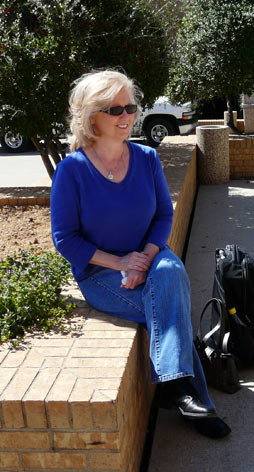By Charles Swanigon/reporter
Anxiety when making a presentation is common, a NW speech professor said last week.
“Research shows that it is not a matter of having butterflies, but how much,” Dr. Bobbi Stringer said when she and Carol Hunsberger, speech instructor, presented Communication Apprehension March 4 on NW Campus.
“The most important way to work through anxiety is to practice,” Stringer said.
Stringer said students should make the presentation to themselves until there is a comfort level. She said practice will reduce the number of butterflies flying around in the stomach.
“Self-concept is important,” Hunsberger said.
Hunsberger advised students to be positive because a poor self-concept will carry over into the presentation.
“Tell yourself that you are a great orator,” she said.
Breathing is also important, Stringer said. To relax and keep control over those butterflies, speakers should inhale through the nose then exhale through the mouth.
In addition, Stringer said being well prepared will make delivering presentations go smoothly. Students need to remain focused on the message and make the goal clear.
“The audience is full of drifters,” Hunsberger said.
Since even the presenter will drift at times, Hunsberger said keeping the attention of the audience is paramount, and that is why attention-getting statements are crucial. She said speakers can draw reference to a funny happening in their lives.
As an example, Hunsberger said her dog died of cancer, so she and her husband got a new golden retriever. But it liked her husband more than her, and she did not like that. So she got a second golden retriever, but she is having problems house breaking it.
Then she asked the audience for advice, immediately asking the closest student with drifting eyes what to do. Hunsberger said she did that to get everyone involved in the presentation.
“Give a startling statistic, tell a joke, read a quote, recite a poem,” she said.
Speakers should do what is necessary to keep the interest of the audience. Telling the audience exactly what is wanted from them helps, but that technique can be tricky in persuasive speeches because it can polarize the audience, Hunsberger said. If the audience believes someone is there to change their beliefs or get money from them, the speaker can lose a large portion of the group. Sometimes, it helps to sugarcoat the agenda in order to gain favor with the audience before starting the sales process, Hunsberger said.
When coming to a close, speakers should use a statement that grabs the audience’s attention again, such as in conclusion, in summary or to reiterate. These terms remind them it is time to start listening again, Hunsberger said.
“The use of adapters is a key component,” Stringer said. “Adapters are props or instruments you pick up or put down to transfer energy or focus.”
The presenter uses adapters to give themselves a break. Gripping or pointing of a pencil is a use of an adapter. Taking a sip of water and taking off glasses are other examples.
Hunsberger told the students to visualize themselves delivering an excellent speech.
“Practice,” she said. “Close your eyes and envision yourself executing the presentation. Think of yourself somewhere that you find comfort.”
Hunsberger used a prisoner of war as an example. While forced to live in a bamboo cage, he would envision himself on the golf course back home. He would imagine himself playing well. He could describe the club he was using and even the difficulty of the course. This was his way of dealing with the fact he could die at anytime.
“Research shows that the anxiety a presenter has before a speech is similar to that of someone whose life is in danger,” Stringer said.
Adrenaline is also a good thing. Just like that athlete on television hyping himself up before a performance, speakers can use adrenaline to their benefit.
Hunsberger said students should remember that audiences are not good at telling whether the speaker is nervous.
The teachers agreed the most important tool is experience, and the more presentations students make, the better they will be because experience breeds confidence.



























